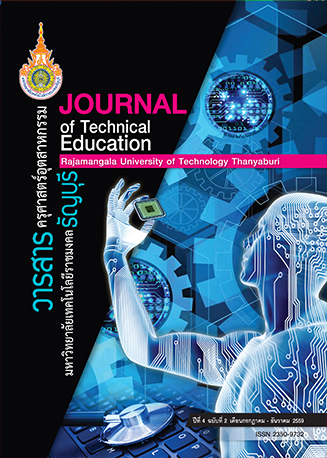วัฒนธรรมองค์การและแรงจูงใจในการทำงานที่ส่งผลต่อประสิทธิผลโรงเรียน ในสังกัดสำนักงานเขตพื้นที่การศึกษามัธยมศึกษาในเขตภาคเหนือของประเทศไทย
คำสำคัญ:
วัฒนธรรมองค์การ, แรงจูงใจในการทำงาน, ประสิทธิผลโรงเรียนบทคัดย่อ
การวิจัยครั้งนี้มีวัตถุประสงค์ 3 ประการ คือ 1) เพื่อศึกษาระดับ วัฒนธรรมองค์การแรงจูงใจในการทำงาน และประสิทธิผลโรงเรียนในสังกัดสำนักงานเขตพื้นที่การศึกษามัธยมศึกษาในเขตภาคเหนือของประเทศไทย 2) เพื่อศึกษาความสัมพันธ์ระหว่างวัฒนธรรมองค์การ แรงจูงใจในการทำงานและประสิทธิผลโรงเรียนในสังกัดสำนักงานเขตพื้นที่การศึกษามัธยมศึกษาในเขตภาคเหนือของประเทศไทย และ 3) เพื่อศึกษาอิทธิพลของวัฒนธรรมองค์การ แรงจูงใจในการทำงานที่ส่งผลต่อประสิทธิผลโรงเรียนในสังกัดสำนักงานเขตพื้นที่การศึกษามัธยมศึกษาในเขตภาคเหนือของประเทศไทย ใช้แนวทำงการวิจัยเชิงปริมาณ เครื่องมือที่ใช้ในการวิจัย คือ แบบสอบถามประมาณค่า 5 ระดับ กลุ่มตัวอย่างที่ตอบแบบสอบถามคือผู้อานวยการโรงเรียน รองผู้อำนวยการโรงเรียน และครูผู้ปฏิบัติการสอนในโรงเรียนในสังกัดสำนักงานเขตพื้นที่การศึกษา มัธยมศึกษาในเขตภาคเหนือ จำนวน 1,299 คน จาก 281 โรงเรียน ได้มาโดยวิธีการสุ่มโรงเรียน แบบกลุ่ม (Cluster random sampling) สถิติที่ใช้ในการวิจัยคือ ค่าเฉลี่ย ส่วนเบี่ยงเบนมาตรฐาน ค่าสัมประสิทธิ์สหสัมพันธ์ (r) ค่าอิทธิพล (ƴ) โดยการวิเคราะห์ถดถอยเชิงพหุ ผลการวิจัยพบว่า 1) ระดับวัฒนธรรมองค์การ แรงจูงใจในการทำงานและระดับประสิทธิผลของโรงเรียนในภาพรวม อยู่ในระดับมาก 2) วัฒนธรรมองค์การกับแรงจูงใจในการทำงานมีความสัมพันธ์เชิงบวกในระดับสูง มากอย่างมีนัยสำคัญทางสถิติ (r=0.904, p <.01) วัฒนธรรมองค์การกับประสิทธิผลโรงเรียนมี ความสัมพันธ์เชิงบวกในระดับสูงมากอย่างมีนัยสำคัญทางสถิติ (r=0.763, p <.01) และแรงจูงใจใน การทำงานกับประสิทธิผลโรงเรียนมีความสัมพันธ์เชิงบวกในระดับสูงมากอย่างมีนัยสำคัญทางสถิติ (r=0.759, p <.01) และ 3) วัฒนธรรมองค์การ มีอิทธิพลต่อประสิทธิผลโรงเรียนในระดับปาน กลางอย่างมีนัยสำคัญทางสถิติ (ƴ =0.419, p<.01) และแรงจูงใจมีอิทธิพลต่อประสิทธิผลโรงเรียน ในระดับปานกลางอย่างมีนัยสำคัญทำงสถิติ (ƴ =0.380, p<.01) และวัฒนธรรมองค์การและ แรงจูงใจในการทำงาน สามารถร่วมกันทำนายหรืออธิบายความผันแปรต่อประสิทธิผลโรงเรียนได้ ในระดับสูงมากถึงร้อยละ 60.80 (R2= .608)
เอกสารอ้างอิง
ขัตติยา ด้วงสาราญ. (2543). แรงจูงใจในการทางานที่ส่งผลต่อความผูกพันของครูโรงเรียนประถมศึกษาสังกัดสานักงานการประถมศึกษาจังหวัดนนทบุรี. กรุงเทพมหานคร : มหาวิทยาลัยศิลปากร.
คุณวุฒิ คนฉลาด. (2540). การพัฒนาองค์การ. ชลบุรี : มหาวิทยาลัยบูรพา.
ชาญณรงค์ เศวตตาภรณ์. (2553). ความสัมพันธ์ระหว่างวัฒนธรรมองค์การกับประสิทธิผลองค์การของหน่วยงานสถานีตารวจนครบาล. กรุงเทพมหานคร : มหาวิทยาลัยเกริก.
นันทพร ชูทรัพย์. (2544). แรงจูงใจที่สัมพันธ์กับความท้อแท้ในการปฏิบัติงานของครูโรงเรียน อาชีวศึกษาเอกชน ในเขตกรุงเทพมหานคร. กรุงเทพมหานคร : ฐานข้อมูลวิทยานิพนธ์ไทย.
ธวัช กรุดมณี. (2550). การวิเคราะห์ปัจจัยที่ส่งผลต่อความมีประสิทธิผลองค์การของโรงเรียนที่บริหารโดยใช้โรงเรียนเป็นฐาน สังกัดสานักงานคณะกรรมการการศึกษาขั้นพื้นฐาน.
กรุงเทพมหานคร : จุฬาลงกรณ์มหาวิทยาลัย.
ธีระ รุญเจริญ. (2546). การบริหารโรงเรียนยุคปฏิรูปการศึกษา. กรุงเทพมหานคร : ข้าวฟ่าง.
ปิติชาย ตันปิติ. (2547). การวิเคราะห์ปัจจัยเชิงระบบที่ส่งผลต่อประสิทธิผลองค์การของสถานศึกษาขั้นพื้นฐาน. วิทยานิพนธ์ปริญญาดุษฎีบัณฑิต. จุฬาลงกรณ์มหาวิทยาลัย.
พัชรี เหลืองอุดม. (2554). การศึกษาแรงจูงใจในการปฏิบัติงานของครูที่ส่งผลต่อประสิทธิผลสถานศึกษาสังกัดสานักงานเขตพื้นที่การศึกษาประถมศึกษาประทุมธานี เขต 2.
วิทยานิพนธ์ปริญญามหาบัณฑิต. มหาวิทยาลัยเทคโนโลยีราชมงคลธัญบุรี. วันชัย มีชาติ. (2549). การบริหารองค์การ. กรุงเทพมหานคร : จุฬาลงกรณ์มหาวิทยาลัย.
วิจลน์ โกษาแสง. (2548). ความสัมพันธ์ระหว่างภาวะผู้นาของผู้บริหารโรงเรียนกับประสิทธิผลของโรงเรียนสังกัดสานักงานเขตพื้นที่การศึกษานครพนมเขต 2. วิทยานิพนธ์ปริญญามหาบัณฑิต. มหาวิทยาลัยสกลนคร.
วิทยากร เชียงกูล. (2556). “รายงานสภาวะการศึกษาไทย 2555-2556”. กรุงเทพธุรกิจ. สืบค้นวันที่ 23 ตุลาคม 2557. จาก https://www.witayakornclub.woldpress.com.
วีรพล จักษ์ตรีมงคล. (2548). ความสัมพันธ์ระหว่างรูปแบบวัฒนธรรมองค์กรกับความพึงพอใจในการทางานของพนักงานฝ่ายครัวการบิน บริษัท การบินไทย จากัด (มหาชน) ณ สนามบินดอนเมือง. วิทยานิพนธ์ปริญญามหาบัญฑิต. มหาวิทยาลัยราชภัฏวไลยอลงกรณ์ในพระบรมราชูปถัมภ์.
ศิลปชัย ศรีเกียรติ. (2550). ความสัมพันธ์ระหว่างวัฒนธรรมโรงเรียนกับประสิทธิผลของโรงเรียนขยายโอกาสทางการศึกษาสังกัดสานักงานคณะกรรมการการประถมศึกษาแห่งชาติในเขตการศึกษา 6. วิทยานิพนธ์ปริญญามหาบัณฑิต.มหาวิทยาลัยบูรพา.
สานักงานคณะกรรมการการศึกษาแห่งชาติ. (2540). แผนพัฒนาการศึกษาแห่งชาติ ฉบับที่ 8 พ.ศ.2540-2544. กรุงเทพมหานคร : สานักงานคณะกรรมการการศึกษาแห่งชาติ.
สานักงานรับรองมาตรฐานและประเมินคุณภาพการศึกษา (องค์การมหาชน) ( สมศ.) (2554). คู่มือการประเมินคุณภาพภายนอกรอบสาม (พ.ศ.2549-2553) ระดับการศึกษาขั้นพื้นฐาน ฉบับสถานศึกษา พ.ศ. 2544. กรุงเทพมหานคร : เม็ทช์พอยท์.
สานักงานคณะกรรมการการศึกษาขั้นพื้นฐาน (2556). บันทึก Diary สพฐ. 2557: 2014. กรุงเทพมหานคร : สกสค. ลาดพร้าว.
สุทธิพงศ์ ยงค์กมล. (2543). การวิเคราะห์ปัจจัยที่ส่งผลต่อประสิทธิผลของโรงเรียนที่ใช้ภาษาอังกฤษเป็นสื่อการสอน. กรุงเทพมหานคร : จุฬาลงกรณ์มหาวิทยาลัย.
Belassi, W., Kondra, A. Z. &Tukel, O. I. (2007). “New Product Development Projects: The Effects of Organizational Culture” Project Management Journal,
42(1) February 2011, 73–90.
Briggs, J.C. (2001). “New species of Lepadichthys from the Philippine Islands.” Copeia, 2001(2), 499-500.
Cherrington, D.J. (1994). The management of individual an Organization Behavior. Boston : Allin and Bacon.
Deci, E. L. (1975). Intrinsic motivation. New York: Plenum.
Denison, D. R. (1990). Corporate Culture and Organizational Effectiveness. New York : Wiley.
Denison, D. R., H. J. Cho, & J. Young. (2000). Diagnosing Organizational Culture: Validating a Model and Method, Working Paper. International Institute for Management Development, Lausanne, Switzerland.
Gordon, G.G. & DiTomaso, N. (1992). “Predicting corporate performance from organizational culture.” Journal of Management Studies, 29, 78-98.
Herzberg, F. (1959). The Motivation to work. New York: John Wiley and Sons.
Hoy, W.K. & Miskel, C.G. (2005). Educational administration: Theory-research-practice. (4th ed.) Singapore: McGraw-Hill.
Kimberly, J. R. (1979). “Issues In Creation of Organization: Initiation, Innovation, and Institutionalization.” Academy of Management Journal, 22
September, 437-457.
Kotter, J.P. & Heskett, J.L. (1992). Corporate culture and performance. New York: Free Press.
Leech, N. L., Barrett, K.C. & Morgan, G.A. (2005). SPSS for Intermediate Statistics: Use and Interpretation. (2nd ed.) Mahwah, NJ: Lawrence Erlbaum.
Luthans. F. (1981). Longman Dictionary of Contemporary English. England : Clays.
Luthan, F. (1995). Organization Behavior. New Jersey: McGraw–Hill.
Mogran, G. (1997). Image of Organization. Thousand Oaks, CA: Sage.
Robbins, S. P. (1990). Organization Theory: Structure, Design, and Applications. Englewood Cliffs, N.J.: Prentice-Hall.
Schein, E.H. (1985). Organization Culture and Leadership. San Francisco: Jossey-Bass.
Wren, C.Y. (1997). “Work Motivation and Perceived Organizational Effectiveness in Middle Schools.”. Available : DAI - A 57/07 : 2796, from
https://wwwlib.umi.com/dissertations/fullcit/9637812.
Yin Cheong Cheng. (1993). School Effectiveness and School - Based Management : A Mechanism for Development. Washington : The Flamer Press.
ดาวน์โหลด
เผยแพร่แล้ว
รูปแบบการอ้างอิง
ฉบับ
ประเภทบทความ
สัญญาอนุญาต
บทความที่ได้รับการตีพิมพ์เป็นลิขสิทธิ์ของมหาวิทยาลัยเทคโนโลยีราชมงคลธัญบุรี
ข้อความที่ปรากฏในบทความแต่ละเรื่องในวารสารวิชาการเล่มนี้เป็นความคิดเห็นส่วนตัวของผู้เขียนแต่ละท่านไม่เกี่ยวข้องกับมหาวิทยาลัยเทคโนโลยีราชมงคลธัญบุรี และคณาจารย์ท่านอื่นๆในมหาวิทยาลัยฯ แต่อย่างใด ความรับผิดชอบองค์ประกอบทั้งหมดของบทความแต่ละเรื่องเป็นของผู้เขียนแต่ละท่าน หากมีความผิดพลาดใดๆ ผู้เขียนแต่ละท่านจะรับผิดชอบบทความของตนเองแต่ผู้เดียว




